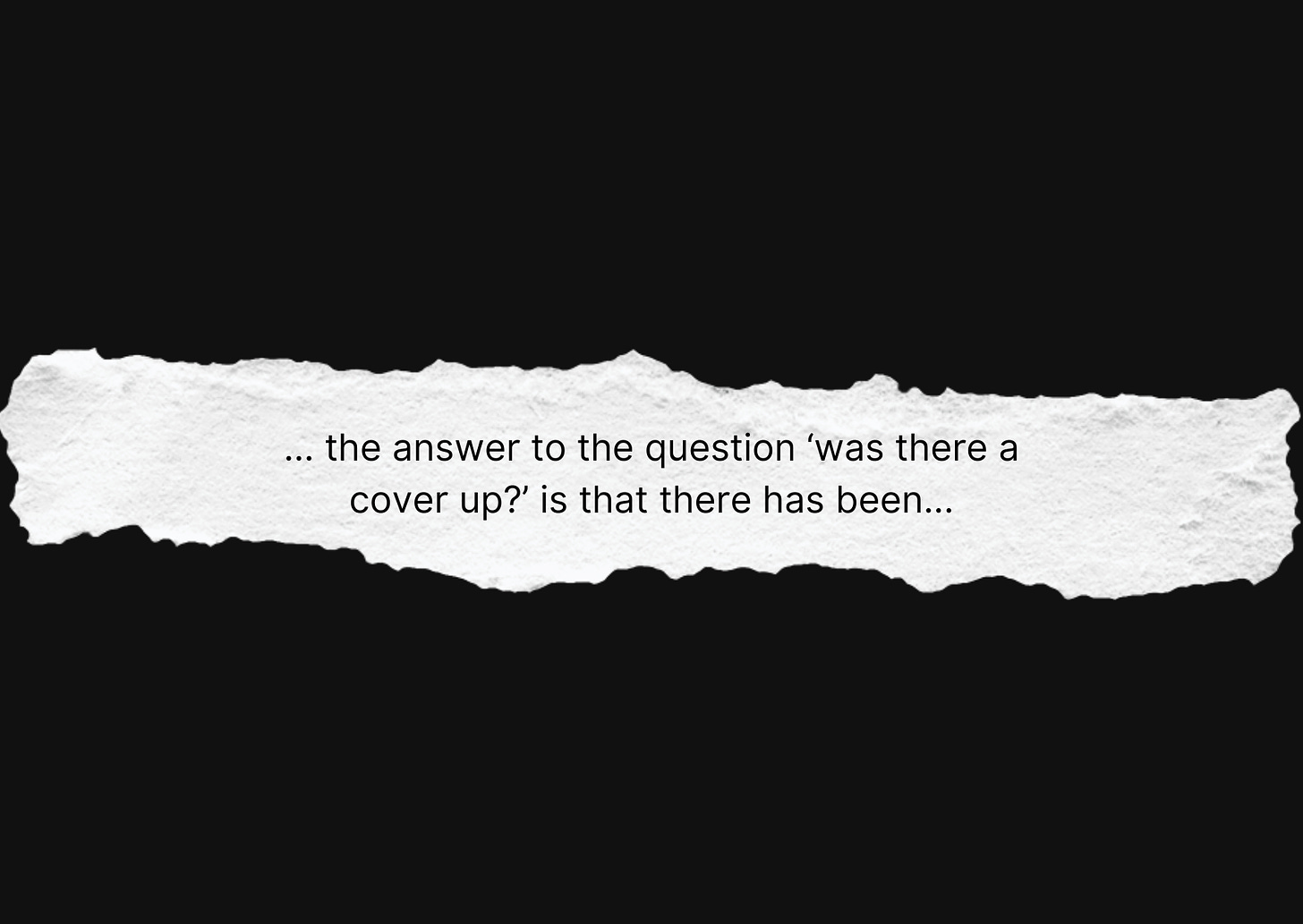The Rosetta Stone of British conspiracies
One paragraph in Sir Brian Langstaff’s 2527-page report into the infected blood scandal explains why 'truth' in Britain is broken.
Previously: Drowning in lukewarm tea
What's the point of The Daily Telegraph's new daily news podcast?
The next edition of the newsletter will be the 900th. What should it be about?
“… the answer to the question ‘was there a cover up?’ is that there has been. Not in the sense of a handful of people plotting in an orchestrated conspiracy to mislead, but in a way that was more subtle, more pervasive and more chilling in its implications. To save face and to save expense, there has been a hiding of much of the truth.”— The Infected Blood Inquiry Report (vol.1)
The scale of horrors detailed in the Infected Blood Inquiry report is such that the British media has convulsed in one of its great spasms of noticing. While there are journalists who’ve been chasing the story for years, for others the arrival of a vast stack of findings from Sir Brian Langstaff — an undertaking he concludes should have happened many years earlier — has triggered a brief bout of intensely questioning how the state functions.
Rishi Sunak opened his parliamentary statement on the report by saying it was “a day of shame for the British state” which “[showed] a decades-long moral failure at the heart of our national life”. It was stark language but it could have been applied to the Post Office debacle, Windrush, the Grenfell disaster, the daylight robbery of the Covid years, and so many other scandals. The desire to save face, save money, and save allies is baked into the way every kind of British establishment functions. Langstaff’s report castigates NHS bosses, civil servants, and politicians alike.
The media goes through a familiar process when a scandal of this magnitude is in the headlines. There are the lists of things you ‘need’ to know, explainers, human interest pieces about the victims and their families, furious op-eds, and leader columns that call for fundamental change. And then… it all moves on. That’s understandable in the sense that the news requires novelty and there’s always something else to cover but each successive scandal doesn’t seem to change the underlying faith in the system.
In his report, Langstaff writes that “dogma became a mantra. It was enshrined. It was never questioned.” It’s a damning line for the NHS, civil service, and ministers, but one that the media will use as a stick to beat those groups without questioning itself for a moment. The Daily Telegraph, a paper which vociferously promoted and defended the Thatcher government and which still treats its central figure as a kind of hairspray saturated secular saint, now howls about “elite secrecy”. The Times, which owes its Murdoch ownership to a dodgy deal engineered by Thatcher, condemns the horrific results of “unaccountable power”.
There are many dogmas that have become mantras in the British media. Take the general acceptance of landlordism as a way of running a housing system, or the comfort with people slipping through the revolving door between the press and politics (and back again). Every summer, the sweaty collision of media figures and ministers at the Spectator garden party is corruption enabled by canapés.
Listening to the radio this morning, I heard commentator after commentator condemn a culture of cover-up, defensiveness, and arse-covering. They’re right but the very same approach permeates the British media, which has a terrible record of facing up to its own failings. There’s a tendency to treat ordinary people as fodder for content which contributes to the very climate where the voices of those who don’t have power are ignored. Langstaff’s report criticised organisations for ruthlessly sticking to “lines to take” which were not true and, in fact, were the exact opposite of the fatal truth. Political reporting that has become so reliant on anonymous sources and background briefings bolsters that world of ‘lines’ that have little to do with reality.
The Daily Telegraph’s leader column on the report ends with a question: “The next such scandal may already be unfolding; will we once again be too slow to avoid it?” The answer is certainly and the media will play a part in that future failure as it has in the horrors that have come before. Yes, investigative journalists play a central role in uncovering injustices but the culture of the British media generally contributes to an environment where the truth emerges slowly.
In the immediate aftermath of a damning report, the media demands major change and thunders that this kind of thing must never happen again. Then things revert to how they have always been with the same voices saying the same old catchphrases. Justice is distributed sparingly — to save face and to save expense.
Please share this edition if you enjoyed it. It really helps.
You can also follow me on Twitter, Threads, BlueSky and/or TikTok.
If you haven’t yet, please consider upgrading to a paid subscription.
It helps and allows me to spend more money on research and reporting. Buy a t-shirt if you’d like to make a one-off contribution and get a t-shirt.




Could you check that I paid my subscription for 2024
Good piece. One could also point out that officials are very often the sacrificial lambs of these scandals. Oftentimes they are running ludicrously underfunded and understaffed organisations to impossibly high performance metrics - metrics which often have little to do with the public interest. The NHS for instance needs to be “leaner” to appeal to private investors..it’s really quite shocking how the media overlooks financial constraints and incentives as contributory factors to these scandals not least because they are the financial constraints and incentives their publications demand from public services on a regular basis..they like to blame specific supposedly useless public servants or abstract bureaucratic inertia more generally…